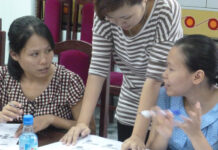
In this scenario a political correspondent working for a broadcaster is asked to speak at an event organised by a political party – but there is a catch.
You are a political correspondent working for a broadcaster. A general election has been called. You receive an invitation to speak at a public event about the role of journalists in covering elections.
After your talk the people who invited you ask whether you would be prepared to do some private coaching for a number of politicians who were interested in what you had to say.
The fee suggested is five times the daily rate you receive from the media organisation you work for. They also hand you a gift as a ‘thank you’ for attending the event.
What do you do?
What do you do?
Do you:
- Accept the gift as a payment for your services, and agree to take on the media training for the politicians. After all, you have expertise that they seem to need and are willing to pay for.
- Hand the gift back, and explain that although you were happy to talk about the role of the journalist in covering elections, you are not interested in coaching politicians on how to manage the media.
- Go back to the office, resign as a journalist and take up a new career teaching politicians how to avoid tough questions and spin a line.
Suggested action
You should hand the gift back, and explain the situation to your editor.
It’s not wise for political journalists to get involved in training politicians. That is the job of public relations and communications professionals.
It’s fine to offer to speak about the role of journalists in covering elections, but it’s not a good idea to be rewarded by a political party, even indirectly.
Accepting gifts
It’s potentially dangerous for a journalist to accept gifts. They will never be free. There will always be a price to pay at some future date.
Your media organisation will have a policy on this. Usually, the best advice is to refuse gifts.
There may be some situations where a reporter or producer on a lifestyle programme is offered facilities to sample so that they can review them.
In such cases the following rules should apply:
- Keep accurate records of what has been accepted.
- Always inform suppliers that they cannot refer to your news organisation in selling their products.
- Never offer suppliers any editorial influence in the programme you are producing.
Conflicts of interest
There must never be any situation where personal, commercial, business, financial or other interests have any bearing on your editorial decisions.
Typical situations where there could be a conflict of interest for journalists include:
- Public speaking/public appearances at events which have a political agenda.
- Media public relations training, where the journalist is asked to train business leaders or politicians in how to avoid tough questions and spin a line.
- Personal connections to charities, campaign organisations, and political parties.
- Accepting hospitality and personal benefits during the course of your work where there is an expectation of an editorial return.
- Personal financial and business interests associated with the stories you are covering.
Conclusion
It’s fine for journalists to speak at public events about their work; how those attending use what they hear is up to them.
But staff members of, or regular freelancers for, any media organisation should always obtain permission from their employers beforehand. As long as you are a journalist working for them, your actions reflect on them whenever you speak, appear or work in any other role you are offered that involves journalism. Your actions can affect your news organisation’s credibility and reputation.
What you should not do is work on behalf of one group or other in order to help them improve how they package and present their particular message and avoid tough questioning from journalists.
The political correspondent in this scenario didn’t do anything wrong, but was probably naive in accepting the invitation in the first place.
They really should have asked more questions about who was organising the event, who would be attending, and why it was being staged.

Analysis
The core issue here revolves around maintaining journalistic integrity and avoiding conflicts of interest, especially during a general election. The invitation to speak at a public event about the role of journalists is seemingly innocuous. However, the subsequent offer of private coaching for politicians, coupled with a substantial fee and a gift, throws up significant red flags.
- The gift:
- As the text correctly points out, gifts are never truly “free.” They create an obligation, real or perceived, and can compromise a journalist’s impartiality.
- Accepting a gift from individuals with political interests during an election cycle is particularly problematic.
- The coaching offer:
- This is where the major ethical breach lies. Offering media training to politicians, particularly in how to “avoid tough questions and spin a line,” directly contradicts the fundamental role of a journalist: to hold power to account and provide unbiased information.
- The exorbitant fee, five times the daily rate, further highlights the potential for corruption and undue influence.
- The invitation itself:
- While speaking about journalism is acceptable, a more thorough vetting of the event organisers and attendees was crucial.
- The correspondent’s “naivety,” as the text suggests, is a significant oversight.
Why the suggested action is correct
Handing back the gift and informing the editor:
-
-
- This demonstrates transparency and a commitment to ethical conduct. It protects both the correspondent’s reputation and the broadcaster’s credibility.
-
Informing the editor allows the news organisation to address the situation appropriately and reinforce its policies on conflicts of interest.
Issues
Perception is reality:
-
-
- Even if the correspondent believes they can maintain objectivity, the public perception of bias is damaging. In today’s highly polarised political climate, trust in media is paramount.
-
The importance of editorial independence:
-
-
- This scenario underscores the need for strict adherence to editorial independence.
- Journalists must be free from any influence that could compromise their ability to report fairly and accurately.
-
The broader implications:
-
-
- This situation isn’t just about one individual. It reflects a broader concern about the blurring lines between journalism, public relations, and political advocacy.
- The rise of social media and the 24-hour news cycle have increased the pressure on journalists, making it even more critical to maintain ethical standards.
-
Proactive measures:
-
- News organisations should provide regular training to journalists on ethical conduct and conflict of interest policies.
- Clear guidelines should be established for accepting speaking engagements and handling potential conflicts.
- When dealing with political events, extra diligence must be taken to discover who is really behind the event.
In essence, this scenario is a cautionary tale about the importance of maintaining journalistic integrity in the face of political influence. The correspondent’s initial missteps highlight the need for vigilance and a deep understanding of ethical obligations. The correct course of action, returning the gift and informing the editor, is essential for preserving public trust and upholding the principles of responsible journalism. The political landscape is a minefield of potential conflicts, and journalists must navigate it with utmost care.








